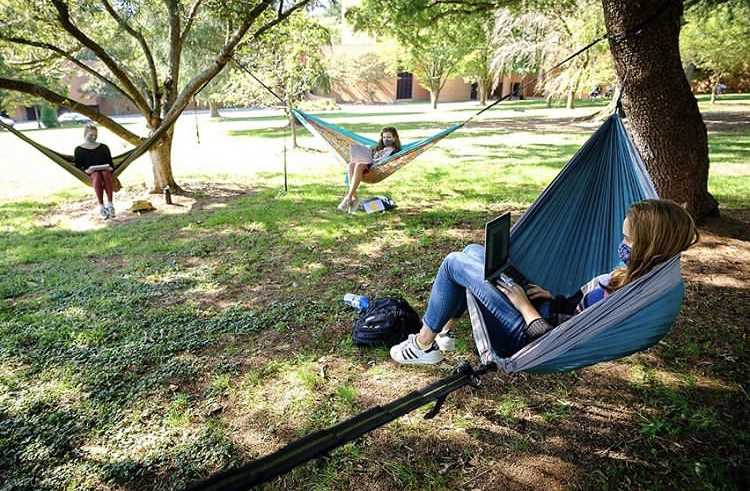
Although students have mostly returned to campus for the fall 2020 semester, the academic experience is undoubtedly altered from what it has looked like in previous semesters. What makes this semester different is our increased reliance on computers for schoolwork, our decreased social and academic interaction and our increased flexibility in completing our work.
To begin with, only 50% of classes have any in person component this semester. This means that at least 50% of the time, students must complete classes synchronously via platforms like Zoom or asynchronously on their computers. Either way, students spend a great amount of time staring at their computer screens and sitting in their dorm rooms to do class. On Tuesdays, for example, I have six hours of synchronous Zoom classes with only a total of two hours of down time in the scheduling gaps. Many students like myself are experiencing what has come to be known as “Zoom fatigue,” the spaciness and lethargy that comes from staring at a computer screen and trying to focus for long amounts of time. In regular academic settings, this kind of fatigue is less common, as students must change classrooms, walk outside between classes, and pass by other students in common spaces as they do so. This basic level of stimulation and socialization keeps one’s brain interested and ready to learn. When the classroom is the same physical space as the bedroom, students experience little to no change in scenery or mindset between classes. Thus, online learning can hinder a student’s ability to focus and learn effectively.
Another downside of online learning is that students are less able to connect with one another and with their professors one on one. Because Wake Forest has such great ratios of students to professors, returning students are accustomed to meeting friends and forging connections in classroom settings. However, this is now a more difficult task, as classes are often on Zoom where we cannot strike a casual conversation with the person we happen to sit next to that day. Even during in person classes, students are often wary of one another and maintain proper social distancing in order to keep each other safe. Thus, the academic experience this semester feels a bit lonelier — without a buddy to check in with about each assignment and deadline, taking classes requires more constant attention to details. While it is true that we can direct message each other on Zoom chat, it is not always considered socially acceptable to message a stranger.
Many students like myself are experiencing what has come to be known as ‘Zoom fatigue’…”
Story continues below advertisement
Despite these flaws in the academic experience this semester, there are some perks. For example, on sunny days, many students Zoom into class from picnic and patio tables. In doing so, they get to enjoy fresh air while completing their schoolwork. Especially in a time where being outside may also feel safer than being inside of a classroom, this is an exciting benefit to Zoom classes.
Another such benefit is the increased degree of flexibility in academic life. For example, the asynchronous lectures allow students the liberty to work ahead as they please. For students who enjoy planning and working ahead, this format is a great advantage. Students with asynchronous lectures also have the opportunity to “reschedule” their class schedule for the day so that they can sleep in, go for runs, meet friends at the Pit and participate other activities that might provide them joy instead of attending a live lecture. In this way, online classes have had a positive effect on students’ abilities to match their schedules with one another.
Finally, Zoom classes also allow students to enroll in classes with professors who might otherwise not be able to teach here. For example, my CRW 385 class is taught by a professor who resides in another state. Without this technological environment, I would be otherwise unable to learn from her this year. While it is true that COVID-19 has altered the academic experience to be less personal and more difficult to comprehend material at times, it is also important to remember that there are benefits as well.
While we are in a global pandemic, it is fortunate that we can continue to take classes and live on campus at all. For this reason, despite the academic fatigue and loss of personalization, the academic experience is still as strong as one could reasonably expect it to be in the face of the pandemic.













